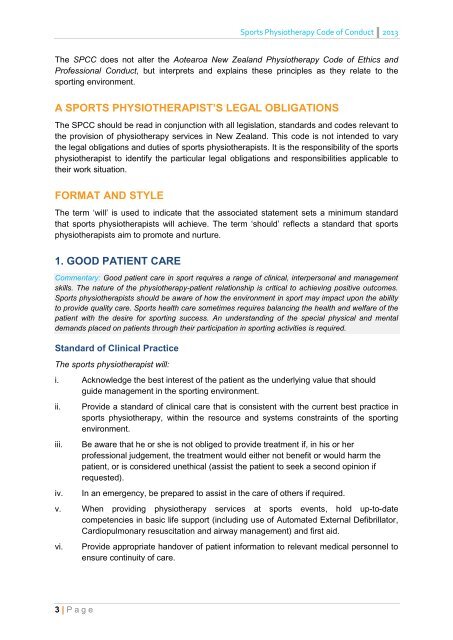Sports-Physiotherapy-Code-of-Conduct
Sports-Physiotherapy-Code-of-Conduct
Sports-Physiotherapy-Code-of-Conduct
Create successful ePaper yourself
Turn your PDF publications into a flip-book with our unique Google optimized e-Paper software.
<strong>Sports</strong> <strong>Physiotherapy</strong> <strong>Code</strong> <strong>of</strong> <strong>Conduct</strong> 2013<br />
The SPCC does not alter the Aotearoa New Zealand <strong>Physiotherapy</strong> <strong>Code</strong> <strong>of</strong> Ethics and<br />
Pr<strong>of</strong>essional <strong>Conduct</strong>, but interprets and explains these principles as they relate to the<br />
sporting environment.<br />
A SPORTS PHYSIOTHERAPIST’S LEGAL OBLIGATIONS<br />
The SPCC should be read in conjunction with all legislation, standards and codes relevant to<br />
the provision <strong>of</strong> physiotherapy services in New Zealand. This code is not intended to vary<br />
the legal obligations and duties <strong>of</strong> sports physiotherapists. It is the responsibility <strong>of</strong> the sports<br />
physiotherapist to identify the particular legal obligations and responsibilities applicable to<br />
their work situation.<br />
FORMAT AND STYLE<br />
The term ‘will’ is used to indicate that the associated statement sets a minimum standard<br />
that sports physiotherapists will achieve. The term ‘should’ reflects a standard that sports<br />
physiotherapists aim to promote and nurture.<br />
1. GOOD PATIENT CARE<br />
Commentary: Good patient care in sport requires a range <strong>of</strong> clinical, interpersonal and management<br />
skills. The nature <strong>of</strong> the physiotherapy-patient relationship is critical to achieving positive outcomes.<br />
<strong>Sports</strong> physiotherapists should be aware <strong>of</strong> how the environment in sport may impact upon the ability<br />
to provide quality care. <strong>Sports</strong> health care sometimes requires balancing the health and welfare <strong>of</strong> the<br />
patient with the desire for sporting success. An understanding <strong>of</strong> the special physical and mental<br />
demands placed on patients through their participation in sporting activities is required.<br />
Standard <strong>of</strong> Clinical Practice<br />
The sports physiotherapist will:<br />
i. Acknowledge the best interest <strong>of</strong> the patient as the underlying value that should<br />
guide management in the sporting environment.<br />
ii.<br />
iii.<br />
iv.<br />
Provide a standard <strong>of</strong> clinical care that is consistent with the current best practice in<br />
sports physiotherapy, within the resource and systems constraints <strong>of</strong> the sporting<br />
environment.<br />
Be aware that he or she is not obliged to provide treatment if, in his or her<br />
pr<strong>of</strong>essional judgement, the treatment would either not benefit or would harm the<br />
patient, or is considered unethical (assist the patient to seek a second opinion if<br />
requested).<br />
In an emergency, be prepared to assist in the care <strong>of</strong> others if required.<br />
v. When providing physiotherapy services at sports events, hold up-to-date<br />
competencies in basic life support (including use <strong>of</strong> Automated External Defibrillator,<br />
Cardiopulmonary resuscitation and airway management) and first aid.<br />
vi.<br />
Provide appropriate handover <strong>of</strong> patient information to relevant medical personnel to<br />
ensure continuity <strong>of</strong> care.<br />
3 | P a g e


